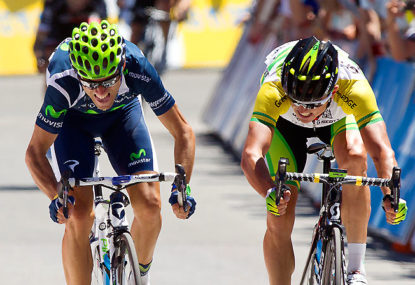'I've just won a stage of the Tour de France, mate!': Hindley grabs yellow jersey as Aussie blows Tour apart
Australia's Jai Hindley has said he is "lost for words" after a shock stage victory at the Tour de France earned him the leader's…

With their heavyweight general classification contenders growing another year older, is Spanish cycling soon to experience a period of drought?
In the grips of a lingering financial malaise, still feeling the effects of the global financial crisis, the ensuing austerity has potentially irrevocably changed the Spanish sporting landscape.
Struggling to keep teams afloat, Spain will soon only field a solitary team in each of the World Tour, Pro-Continental and Continental rankings. A sad state of affairs for a nation which once fielded several teams throughout the World Tour, Pro-Continental and Continental ranks.
The decreasing number of opportunities is forcing several Spanish cyclist to retire, search abroad for opportunities, or accept the reality of lower salaries, which hurts the hard-working domestiques and young up-and-comers far worse than the established superstars.
While the Basque Country has historically been a hotbed for cycling in Spain, not even Basque cycling has been immune to the austerity measures that have stricken the nation. Crowd funding and sponsorships revenues have dwindled, while government funding has been cut back and refocused to save other Basque sporting institutes from certain doom.
A year after the collapse of former Basque World Tour team Euskaltel-Euskadi, in the shadows of the 2014 Tour de France, Spain and the Basque Country have lost yet another cycling team. While it was initially thought the team might survive for at least another year, funding constraints have forced the Continental ranked Euskadi team to cease to be this August.
With an illustrious history of providing young Basque cyclists with an opportunity to try and become professional riders in the Pro-Continental and World Tour ranks, the Euskadi team has provided the pro-peloton with several talented riders since its inception as the Orbea development team, with Mikel Nieve perhaps the most notable.
There still exists a strong, talented Spanish core in the pro-peloton, with Spanish team Movistar leading the way having snapped up some of the best and brightest in the aftermath of Euskaltel-Euskadi’s collapse. However, with Nairo Quintana still just 24, and Alejandro Valverde arguably still able to contest for at least the 2015 Giro d’Italia or 2015 Vuelta a Espana, will the likes of Ion Izagirre be given the chance to prove they could be the future?
Mikel Landa, who currently rides for Team Astana after the collapse of Euskaltel-Euskadi, is another Spanish rider with the talent to potentially become a world-class climber. However, without pressure from a Spanish sponsor for the team to produce a Spanish Grand Tour contender, facing competition from teammates like Fabio Aru for leadership opportunities, and in a climate that almost demands success in the biggest races, Landa will need to continually improve year upon year.
Interestingly, news about the Fernando Alonso Cycling Team (FACT) has been relatively thin on the ground since Alonso’s appearance at the 2014 Giro d’Italia re-sparked questions about the status of the project. The return of a second Spanish sponsored team to the World Tour ranks could go some way to opening up new pathways and opportunities for Spanish prospects.
Indeed, the current renaissance being experienced by Italy and Colombia in cycling and the steadily improving level of competition being offered by non-traditional road cycling powers such as Great Britain and Australia, possibly couldn’t have come at worse time for Spanish cycling hopefuls.
While the positive growth of the sport is a necessity, from a Spanish point of view, the additional competition for contracts and leadership opportunities on the professional teams is also a curse.
Should one, or more, of the younger Spanish riders in the pro-peloton step up when Spain’s latest generational reign at the top of the sport concludes, then the cracks emerging could possibly be papered over for another few year.
However, unless the Spanish economy improves and the funding for both professional and grassroots cycling returns, then Spanish cycling’s ability to uncover and develop a new generation of potential world-beaters could be profoundly damaged.